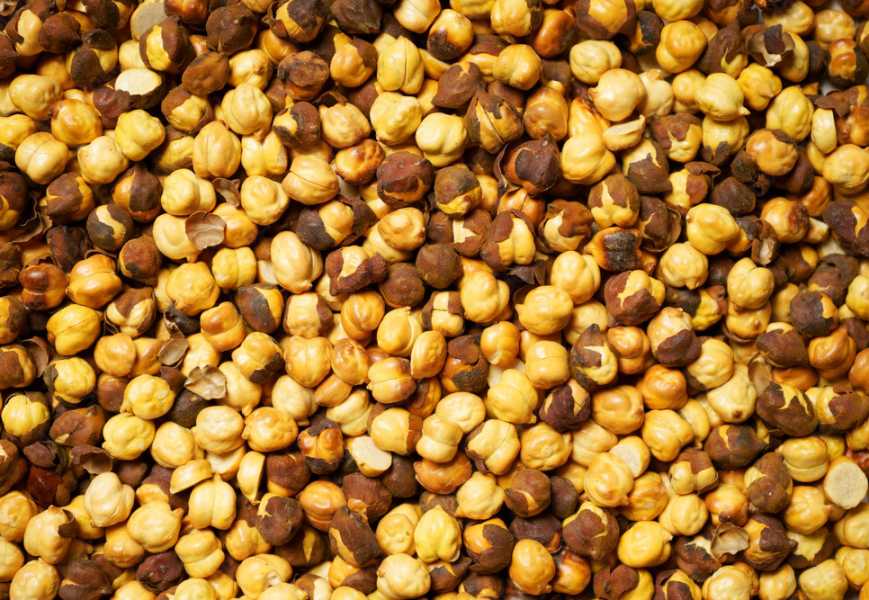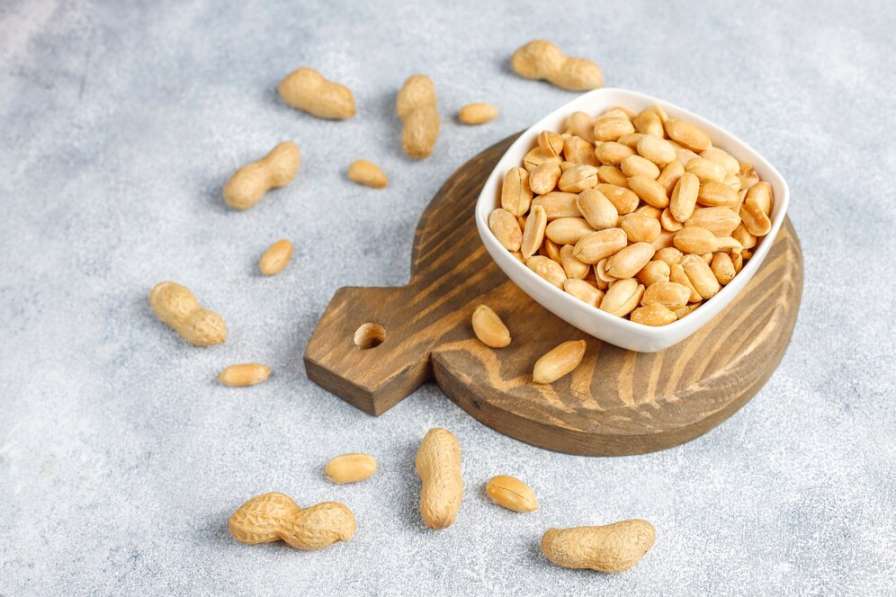Pistachio benefits and side effects
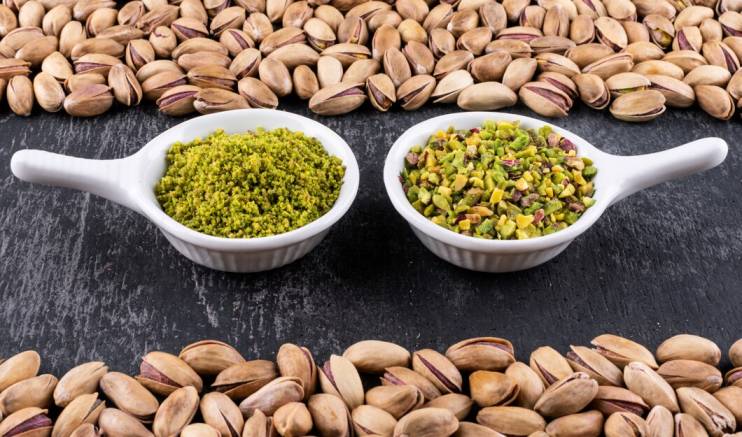
- Pistachios are a healthy supplement to any diet. They contain 20% protein, which is a substantially greater calorie-to-protein ratio than other nuts. This protein can help you feel fuller for longer and manage your weight.
- Pistachios are also high in antioxidants, ranking second only to walnuts and pecans. Antioxidants aid in the battle against free radicals, which are substances in your body that can disrupt cells, proteins, and DNA, resulting in rapid ageing and illnesses such as cancer, diabetes, and heart disease.
- Pistachios are high in potassium and unsaturated fatty acids. Both are anti-inflammatory and antioxidant. Pistachios, like other nuts, are the foundation of the Mediterranean diet, which has been linked to improved long-term health.
- Flavonoids, carotenoids, lutein, zeaxanthin, anthocyanins, proanthocyanidins, and other antioxidants are abundant in pistachios. They also have B6, B1, protein, fibre, copper, and phosphorus. Furthermore, they are one of many nuts that are minimal in calories and fat. They can aid with weight loss, heart health, cancer prevention, and so on.
What are pistachios?
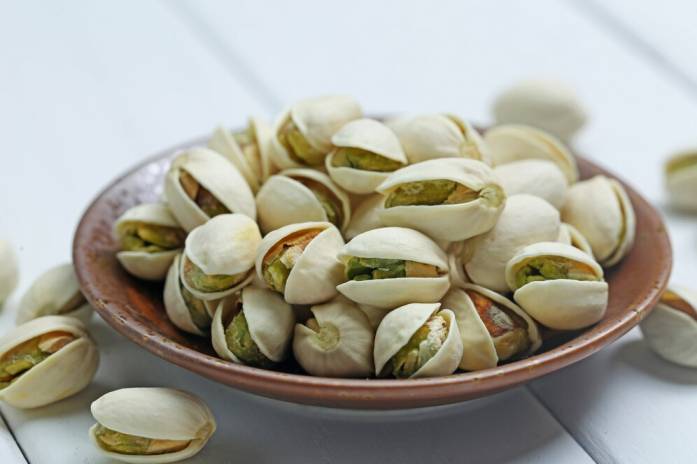
- There are many types of nuts like peanuts, wallnuts, pistachio nuts, etc. Pistachios are the pistachio tree’s seeds. They’re usually green and have a slightly sweet flavour.
- They are typically an inch long and half an inch in diameter. If you wish to eat one, you must first crack open its hard shell.
- Pistachios can be purchased shelled, unshelled, roasted, or salted. They’re available in most grocery stores, and pistachio producers sell them in bulk.
Pistachio benefits
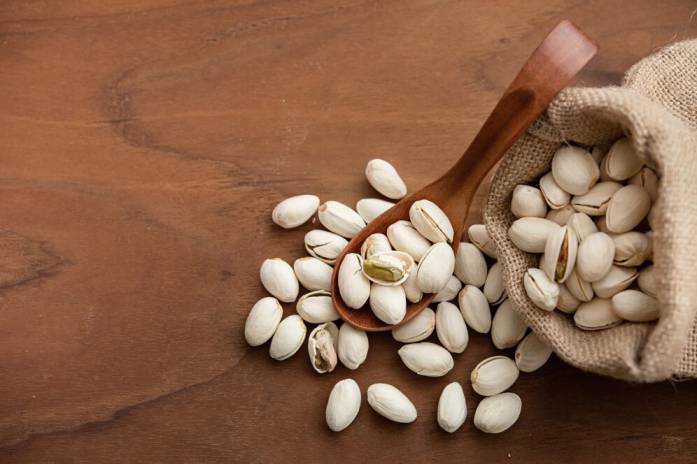
1. Enhanced blood vessel health
- Because amino acids are considered necessary, if your body cannot produce them, you must obtain them through your food.
- According to some research, the amino acids in pistachios lower the amount of fat and sugar in your blood and can tone up and make your blood vessels more flexible.
2. Growth of beneficial gut bacteria
- Pistachios are high in fibre, which can act as a prebiotic, or food that the healthy bacteria in your gut ingest to help them thrive.
- The fibre is then fermented by your gut bacteria and converted into short-chain fatty acids, which help lower your risk of cancer, heart disease, and digestive disorders.
- Copper, manganese, vitamin B6, phosphorus, and thiamine are all found in pistachios. These minerals and nutrients help in the replenishment of the microbiota (the microbial environment in the gastrointestinal tract).
- The microbiota helps to strengthen the gut, shape the intestinal tract, and protect the body from pathogens. It also reduces gastrointestinal irritation and boosts metabolism. Furthermore, the pistachio’s high fibre content helps digestion by adding weight to the stool.
- Pistachios support healthy bacteria known as probiotics, which are extremely important to intestinal health. Probiotics help in the absorption of vital nutrients from food, such as protein, vitamins, and minerals. They also help to reduce the pH level in the colon, allowing waste to flow through more easily.
3. Reduced blood pressure and cholesterol
- Pistachios have been demonstrated to reduce cholesterol levels. These nuts are abundant in fibre and polyunsaturated and monounsaturated fats, which are all associated with healthy cholesterol levels and a lower risk of heart disease.
- Furthermore, studies demonstrate that consuming pistachios lowers blood pressure, especially when compared to other nuts.
4. Antioxidant-rich and anti-inflammatory
- Pistachios include antioxidants such as lutein, beta-carotene, selenium, flavonoids, proanthocyanidins, and gamma-tocopherol. These antioxidants protect the body from free radicals and cell damage. Furthermore, lutein, beta-carotene, and flavonoids aid in the reduction of UV damage, the prevention of ageing, and the improvement of skin tone.
- Pistachios also help to minimise cardiac inflammation. Inflammation may lead to heart attacks and other cardiovascular diseases. Pistachios include polyphenol, which reduces the risk of cardiovascular disease by boosting anti-inflammatory and anti-platelet qualities, as well as enhancing the inner lining of the heart and blood vessels.
- Pistachios contain vitamin C, a powerful antioxidant. It helps in the reduction of oxidative stress and the prevention or reduction of free radical damage. As a result, it promotes healthy ageing and lowers inflammation.
- Pistachios also have vitamin E, which feeds and moisturises the skin from within. They also regulate insulin levels and improve blood circulation, which helps in acne reduction. Vitamin E also helps to reduce the risk of cardiovascular disease and prostate cancer caused by inflammation.
5. Improved eye health
Among nuts, pistachios offer the highest quantities of zeaxanthin and lutein, both of which protect your eyes from blue light damage as well as macular degeneration, an eye illness that can cause vision loss as you age.
6. Normal blood sugar levels
- Pistachios have a low glycemic index, which indicates they don’t cause huge blood sugar rises.
- They also include antioxidants, carotenoids, and phenolic compounds, all of which help to maintain healthy blood sugar levels.
7. Weight reduction
- Pistachios may also help in weight loss. They’re high in fibre and protein, which keeps you satisfied and may help you eat less.
- They include polyunsaturated and monounsaturated fats, which are both healthy fats. Because these fats are soluble, they do not build up in the body and decrease weight. As a result, pistachios help with weight loss.
- Furthermore, they cause a feeling of satiety, which helps with appetite suppression. Our bodies are unable to absorb all of the calories in pistachios. They can only absorb 5% of all calories, resulting in healthy weight loss.
- A handful of pistachio nuts for breakfast or an evening snack per day will help you lose weight naturally.
8. Cardiovascular wellness
- Pistachios include healthy fats like polyunsaturated and monounsaturated fats. The unsaturated fats in pistachios are nourishing to the heart.
- Pistachios can also assist people with diabetes and lower their risk of stroke. It is because pistachios have a high concentration of phytosterols. It reduces dietary glucose absorption in the body.
- In the body, carbohydrates are turned into sugar. An excess of carbohydrates in the body is what causes a high blood sugar level. Pistachios include healthy lipids that help lower blood pressure in the body.
- They’re also high in antioxidants, carotenoids, polyphenols, vitamin E, and vitamin C. All of these nutrients help in the flexibility of your blood vessels.
9. Pistachios Help with Sexual Health
- Pistachios are high in L-arginine, which our bodies use to produce nitric oxide. It helps increase blood flow while you are stimulated.
- Pistachios include vitamin E, which improves erectile performance and lowers oestrogen synthesis in the male body. Furthermore, pistachios are a popular nut for males in the Middle East because they improve the quality of sperm.
- It is one of the few foods that is high in aphrodisiac characteristics. Aphrodisiac qualities improve sexual energy, particularly in men.
10. Beneficial to Women
- Pistachios can also help women prevent and treat PCOS. This is because it lowers insulin levels in the body and helps to balance hormones. According to research, nuts high in PUFAs and MUFAs help normalise insulin, testosterone, and cholesterol levels.
- Pistachios are high in potassium, calcium, folate, iron, and a decent source of protein and fibre, all of which are necessary for a baby’s healthy growth. However, pregnant women should always consult their doctor before consuming.
11. Pistachios Enhance Sleep Quality
- Pistachios are high in melatonin, a hormone that causes us to sleep.
- Melatonin is a sleep hormone that regulates our sleep-wake cycle as well as our sleep quality. As a result, eating pistachios 2-3 hours before bedtime can increase sleep quality.
12. Pistachio benefits for men
Pistachios are high in vital vitamins and minerals that not only help in male fertility but also benefit the consumer’s overall health. Here are some of the benefits of pistachios for male fertility:.
- Their high protein, fat, and fibre content promotes sperm quality and motility.
- They are abundant in a substance called an amino acid that promotes blood flow to the penis, resulting in longer-lasting erections and better sperm.
- They also include significant quantities of antioxidants, which help prevent sperm harm and generate healthy sperm.
- Pistachios can also help men control their weight. Obesity is one of the primary causes of male infertility. Pistachios can help men control their weight and increase fertility.
Side effects of eating pistachios
1. May cause high blood pressure
- Excessive pistachio consumption might result in elevated blood pressure.
- You could experience dizziness, blurred vision, confusion, and fainting. Consuming salted pistachios may also raise your blood sodium level, raising your risk of developing numerous cardiovascular diseases, such as hypertension.
2. Has the potential to harm the digestive system
- Pistachios have a high fibre content. As a result, eating a lot of pistachios will upset your digestion and induce diarrhoea, cramps, stomach pain, intestinal pain, and irritable bowel syndrome.
- Pistachios contain fructan, which can induce gastrointestinal allergies.
3. Possibility of Weight Gain
- Excessive pistachio consumption might lead to weight gain.
- This is because consuming more pistachios on a daily basis will increase your calorie consumption, resulting in weight gain.
4. Allergic reactions
- People who are allergic to tree nuts should avoid eating pistachios.
- An allergy to tree nuts can include vomiting, trouble swallowing, irritation in the mouth, nasal congestion, cramping, and nausea.
5. Cancer Risk May Be Increased
- Consuming roasted pistachios may raise one’s risk of developing cancer.
- Pistachios roasted at high temperatures may produce acrylamides, a carcinogen responsible for the development of cancer cells in the body, potentially increasing the risk of cancer
6. Increases the risk of kidney stones
- Oxalates and methionine are found in pistachios. Excessive pistachio consumption can increase the release of oxalates and methionine in the body.
- Calcium and potassium Oxalates are formed when oxalates bind to calcium and potassium. Simultaneously, methionine can be converted into cysteine, which can lead to the production of cystine kidney stones.
Conclusion
Pistachios are beneficial to the human body because they contain essential nutrients such as vitamin C, vitamin E, folate, protein, fibre, and minerals. Furthermore, they include antioxidants such as flavonoids, beta-carotene, zeaxanthin, anthocyanins, and proanthocyanidins. These nutrients minimise the risk of cardiovascular disease, enhance sleep quality and digestion, and aid in weight loss. However, everything is only useful when consumed in moderation. It can assist in providing all of its health benefits.
Excess pistachio consumption may also cause allergies, weight gain, an increased risk of cancer, kidney stones, digestive difficulties, and high blood pressure. As a result, eating pistachios in moderation may provide you with a variety of health benefits while also avoiding any potentially harmful side effects.
FAQs (Frequently Asked Questions)
Q: How many pistachios should you consume each day?
A handful of pistachios in the evening will help you reap all of its benefits while also improving your metabolism.
Q. Can I eat pistachios every day?
A. Any nut should be consumed in moderation. Thus, eating pistachios five times a day yields a positive result while maintaining intake.
Q. Do pistachios have any skin benefits?
A. Pistachios are high in vitamin C and E. Both vitamins nourish the skin while also preventing cell damage and oxidative stress in the body, resulting in younger-looking, glowing skin.
Q. Are pistachios harmful to the kidneys?
A. Although pistachios do not directly affect the kidneys, they do contain oxalates and methionine (which turns to cystine). As a result, eating a lot of pistachios may raise your risk of getting oxalate and cystine kidney stones.
Q. Can pistachios help you sleep?
A. Pistachios have the highest melatonin content of any nut. Melatonin is a hormone that regulates sleep. As a result, a handful of pistachios can help enhance sleep quality and the sleep-wake cycle.
Q. Is pistachio healthy for pregnant women?
A. Pistachios are high in potassium, calcium, folate, and iron, which are beneficial to both the mother and the infant. Furthermore, protein and fibre are required for a baby’s healthy growth. However, before ingesting anything while pregnant, always ask your doctor.
Q. Why are pistachios so unhealthy?
A. Pistachios have numerous health benefits, including the ability to maintain a healthy weight, improve heart health, and lower the risk of cancer. Consuming pistachios in excess of the recommended amount, however, might cause diarrhoea, cramps, abdominal pain, intestinal pain, and irritable bowel syndrome due to their high fibre level.
Q. Is pistachio beneficial to sperm?
A. Pistachios are well-known for their ability to improve men’s sexual health. Pistachio is a food that contains a lot of aphrodisiac characteristics. Aphrodisiac qualities improve sexual vigour, particularly in men.
Q. Are pistachios healthy for your hormones?
A. Pistachios have a high melatonin content. It is a hormone that controls the sleep-wake cycle and sleep quality. Pistachio consumption at night increases melatonin levels, resulting in improved sleep quality and sleep cycle.
Q. What happens if you eat pistachios on a daily basis?
A. Pistachios are high in healthy fats, including polyunsaturated and monounsaturated fats. As a result, they aid in the reduction of harmful LDL cholesterol and the promotion of good HDL cholesterol. They also help in the reduction of blood sugar levels, weight loss, and the improvement of digestion and skin.
Q. Do pistachios increase testosterone levels?
A. Pistachios contain a high concentration of phytosterol, which causes a decrease in testosterone levels in men when ingested in excess. Even so, when ingested in the recommended amount, it aids in the improvement of erectile function in men.

